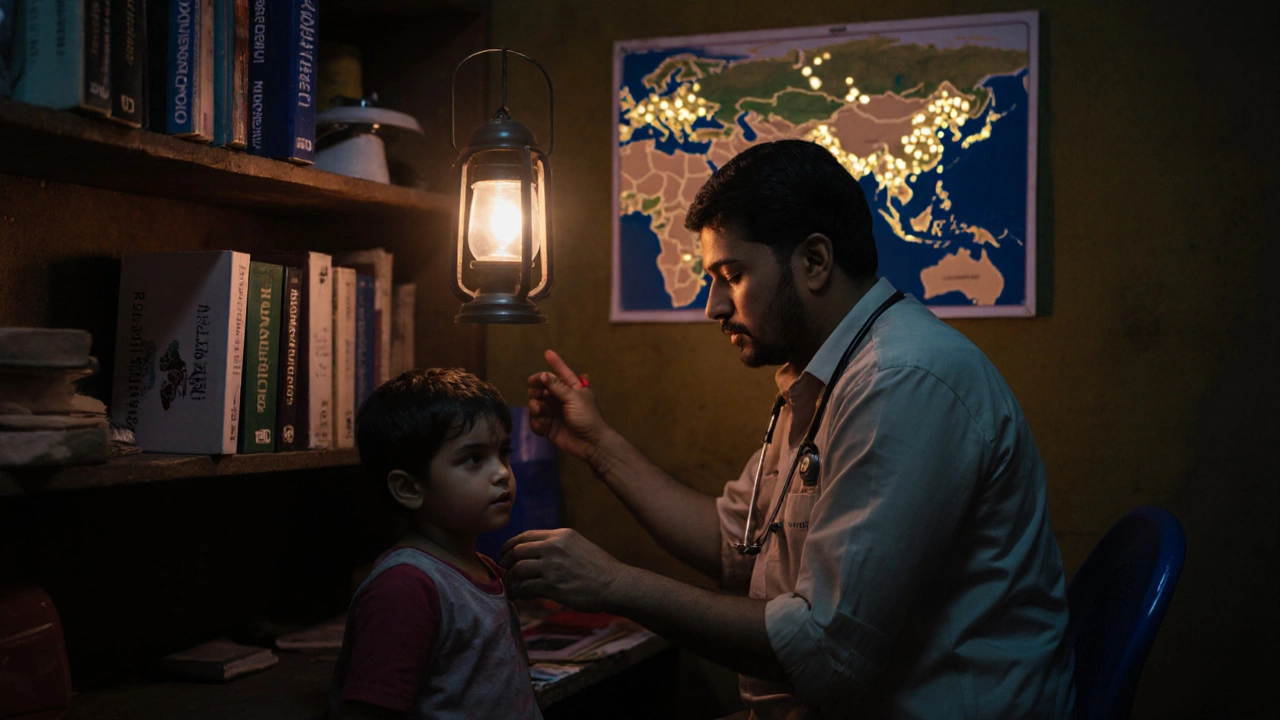Passing NEET is just the first step. The real question isn’t whether you got in - it’s which doctor you want to become next. Thousands of students clear NEET every year, but few stop to think about what comes after the exam. Choosing a specialty isn’t just about prestige or salary. It’s about your daily work life, your tolerance for stress, your passion for certain types of patients, and the kind of impact you want to make. This isn’t a list of the ‘most popular’ fields. It’s a real-world guide to what actually matters when you’re standing at that crossroads.
MBBS is the base - not the finish line
NEET qualifies you for MBBS. That’s your entry ticket. But MBBS alone doesn’t make you a specialist. After five and a half years of study, including a year of rotating internship, you’ll be a general physician. You can treat common illnesses, handle emergencies, and manage chronic conditions. But if you want to focus on one area - like children’s health, heart surgery, or brain disorders - you need postgraduate training.
Most students don’t realize that MBBS is like learning how to drive a car. You can drive anywhere, but if you want to race, haul freight, or drive off-road, you need specialized training. The same goes for medicine. Your MBBS gives you the foundation. Your MD/MS or diploma decides your path.
Top specializations after NEET - and who they’re really for
Here are the most common and in-demand paths, not ranked by popularity, but by real-life fit.
- MD General Medicine - This is the most common next step. You’ll manage complex adult diseases like diabetes, hypertension, kidney failure, and infections. If you like solving puzzles, diagnosing unclear symptoms, and working in hospitals with high patient volume, this is your lane. You’ll spend less time in the OR and more time in wards and clinics. Demand is high, especially in urban areas.
- MS General Surgery - If you’re comfortable with long hours, steady hands, and making quick decisions under pressure, surgery might suit you. You’ll operate on everything from appendicitis to cancer. The workload is brutal, but the results are immediate. Surgeons often work 12-16 hour days, especially early in their career. This path isn’t for those who want a 9-to-5.
- MD Pediatrics - Working with children requires patience, communication skills, and emotional resilience. Parents are anxious. Kids don’t always tell you what’s wrong. You’ll deal with vaccines, asthma, infections, and developmental delays. Pediatricians often build long-term relationships with families. If you love seeing kids grow and heal, this is deeply rewarding.
- MD Obstetrics & Gynecology - This is one of the most demanding specialties. You’ll manage pregnancies, deliver babies, handle emergencies like hemorrhages, and treat reproductive cancers. Many OB-GYNs work nights and weekends because labor doesn’t wait. If you thrive in high-stakes, time-sensitive situations and enjoy seeing new life come into the world, this is powerful work.
- MD Psychiatry - Mental health is exploding in demand. You’ll treat depression, anxiety, schizophrenia, addiction, and trauma. There’s less stigma now, and more patients seeking help. You’ll spend more time listening than prescribing. If you’re empathetic, good at reading between the lines, and want to change lives without scalpels, this is growing fast.
- MD Radiology - You won’t see patients every day, but you’ll be the invisible expert behind every scan. You’ll interpret X-rays, MRIs, CTs, and ultrasounds. It’s quiet, detail-oriented work. Good for people who like technology, patterns, and working independently. Salaries are high, and lifestyle is better than surgery or ER.
- MD Dermatology - Skin conditions are everywhere - acne, eczema, psoriasis, skin cancer. You’ll see patients in clinics, not hospitals. Hours are regular. You’ll build a private practice easily. If you like visual diagnosis and want a balanced life, this is one of the most attractive options.
What no one tells you about specialization choices
Many students pick specialties based on what their parents want, what’s ‘trending,’ or what they saw on TV. That’s a mistake.
Ask yourself: Do you like working with your hands? Then surgery or orthopedics might suit you. Do you prefer talking and listening? Psychiatry or pediatrics could be better. Do you hate unpredictable hours? Avoid emergency medicine or obstetrics. Do you want to open your own clinic later? Dermatology, ophthalmology, or radiology give you that path faster.
Also, don’t ignore rural needs. India has a massive shortage of doctors in small towns. A general physician in a rural hospital can make more impact than a top surgeon in a city. Some students go for MD in Community Medicine or Family Medicine - not flashy, but desperately needed.
What about super-specialties? (DM/MCh)
After MD/MS, you can go further. DM (Doctorate of Medicine) or MCh (Master of Chirurgiae) means super-specialization. Think neurology, cardiothoracic surgery, pediatric neurology, or oncology. These take another 3 years. They’re for people who are obsessed with one tiny area of medicine - like brain tumors or congenital heart defects.
But here’s the truth: 90% of doctors never go beyond MD/MS. The training is long, the competition is fierce, and the pay increase doesn’t always justify the extra years. Only pursue super-specialties if you’re truly passionate - not because you think it’s the ‘highest’ degree.
What’s the earning potential?
Salaries vary wildly based on location, hospital type, and experience. Here’s a rough idea after 5-7 years post-MBBS:
- General physician in a private clinic: ₹8-15 lakhs/year
- MD General Medicine in a corporate hospital: ₹15-25 lakhs/year
- Surgeon in a big city hospital: ₹20-40 lakhs/year
- Psychiatrist in private practice: ₹12-30 lakhs/year
- Dermatologist with own clinic: ₹18-50+ lakhs/year
- Super-specialist (DM/MCh): ₹30-80+ lakhs/year
But money isn’t everything. A dermatologist in a small town might earn ₹12 lakhs but have a great lifestyle. A surgeon in a metro might earn ₹35 lakhs but work 80-hour weeks. Choose based on your life, not just your bank balance.
How to decide - a simple 3-step test
Stop overthinking. Use this quick filter:
- What kind of work do you enjoy? Are you drawn to quick fixes? Long-term care? Emotional support? Technical analysis?
- What kind of life do you want? Do you need weekends off? Are you okay with on-call nights? Do you want to travel? Open a clinic? Work abroad?
- What are you naturally good at? Are you calm under pressure? Great with kids? A detail-oriented observer? Good at explaining things?
If your answer to all three lines up with a specialty, that’s your path. If not, keep exploring.

What about abroad?
If you’re thinking of moving to the US, UK, Canada, or Australia after NEET, know this: your Indian MBBS is recognized, but you’ll need to pass licensing exams like USMLE, PLAB, or MCCQE. It takes 2-4 extra years and costs ₹20-40 lakhs. Many students do it - but only if they’re fully committed. Don’t go abroad just to escape competition. Go because you want to practice there.
Canada and Australia have high demand for doctors, especially in rural areas. But the process is strict. You’ll need to prove language skills, complete clinical rotations, and often work under supervision for years before full licensure.
What if you don’t get into MD/MS?
Not everyone gets into their first-choice PG course. That’s okay. Many students take a year off to prepare again. Others take diplomas like DGO (Obstetrics), DCH (Child Health), or DMRD (Radiology). These are shorter (2 years), cheaper, and still lead to good careers. You can work in hospitals, clinics, or diagnostic centers.
Some even go into medical writing, healthcare management, or public health. NEET opened the door to medicine. It doesn’t lock you into one path.
Final thought: There’s no ‘best’ doctor - only the right one for you
The ‘best’ doctor after NEET isn’t the one with the highest salary or the most prestige. It’s the one who wakes up excited to go to work. It’s the one who doesn’t dread Mondays. It’s the one who feels their work matters.
Don’t choose a specialty because your friend picked it. Don’t choose it because your uncle is a surgeon. Choose it because you’ve spent time thinking about what you truly enjoy - not what looks good on paper.
Medicine is a marathon. Pick the right pace. Pick the right path. The rest will follow.
Can I become a doctor without clearing NEET?
No, you cannot practice as a medical doctor in India without clearing NEET. It’s the only entrance exam recognized by the National Medical Commission (NMC) for MBBS admissions. Even private colleges and deemed universities require NEET scores. There are no legal shortcuts.
Which medical specialization has the least work hours?
Dermatology, radiology, and ophthalmology typically have the most regular hours. These are mostly outpatient-based specialties with fewer emergencies. You’ll rarely be on call overnight. Dermatologists often work 9-to-5 schedules, especially in private clinics. That’s why many choose these paths for work-life balance.
Is it better to do MD or MS after MBBS?
It depends on your interests, not prestige. MD (Doctor of Medicine) is for non-surgical specialties like medicine, pediatrics, psychiatry. MS (Master of Surgery) is for surgical fields like general surgery, orthopedics, gynecology. Neither is ‘better.’ Choose based on whether you want to operate or manage conditions with medicines and therapy.
How long does it take to become a specialist after NEET?
After clearing NEET and completing MBBS (5.5 years), you need 3 more years for MD/MS. That’s 8.5 years total. If you go for a super-specialty (DM/MCh), add another 3 years - making it 11.5 years. Some diplomas take only 2 years, letting you specialize faster.
Can I switch specialties after choosing one?
Technically, yes - but it’s extremely difficult. Once you’re in MD/MS, switching requires reapplying through NEET PG again. You’ll lose 2-3 years and compete with fresh MBBS graduates. Most doctors stick with their first choice. Plan carefully before you commit.
Do I need to join a coaching institute for NEET PG?
Not mandatory, but highly recommended. NEET PG is highly competitive, with over 2 lakh candidates for 40,000 seats. Coaching institutes provide structured study plans, mock tests, and updated question banks. Many top rankers use them. Self-study works if you’re extremely disciplined, but coaching gives you an edge.
